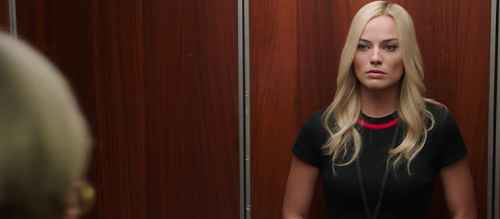Bombshell (2020) Review
This article was written exclusively for The Film Magazine by The CineBlog’s Sophie Butcher.
Bombshell (2020)
Director: Jay Roach
Screenwriter: Charles Randolph
Starring: Charlize Theron, Margot Robbie, Nicole Kidman, John Lithgow, Kate McKinnon
Several times during Bombshell, Megyn Kelly (Charlize Theron) is accused of being a feminist. She rebukes the suggestion every time; “I’m not a feminist, I’m a lawyer”.
#MeToo and Time’s Up were some of the defining stories of the last decade. Bombshell looks at the takedown that preceded those movements – Fox News journalist Gretchen Carlson (Nicole Kidman) filing a lawsuit against network boss Roger Ailes (John Lithgow) to expose the sexual harassment and discrimination that she had experienced from him during her time at the channel.
The film focuses on Kelly, Carlson, and Kayla (Margot Robbie), a rookie production assistant who is determined to hustle her way into becoming an anchor. It chronicles the year or so leading up to the result of the lawsuit, including Kelly’s run in with soon-to-be President Trump – designed to give some context around her words on ‘protecting women’, but her desire to avoid making herself the story. As Kelly’s profile is booming, Carlson’s is shrinking. Once she’s fired, she makes her move against Ailes, then watches her grenade go off whilst waiting for other women to come forward.
The tone is jarring from the outset, largely due to the extreme prosthetics, hair and makeup applied to get the stars looking as much like their real life counterparts as possible. Theron’s comes off best, but Kidman’s is off putting, taking you out of the movie with every shot. Lithgow is shrouded in a fatsuit, a stigmatising and dehumanising tactic that Hollywood won’t seem to let die, and Malcolm McDowell’s face is made to mirror Rupert Murdoch’s weirdly lumpy and dimpled appearance. The effort is clear, but all the layers act as somewhat of a barrier to the performances; having trust in the actors to convince us of their characters without such drastic alterations would have made for a much better viewing experience overall.
The subject matter couldn’t be more serious, but Charles Randolph’s screenplay and Jay Roach’s direction (known for schlocky comedies including Dinner for Schmucks and Meet The Fockers) swings between attempts at wit and convoluted moments of shock and sympathy. The end result feels like a pauper’s version of The Big Short, with all the gloss of Adam McKay’s depiction of the financial crash, but nowhere near the amount of skill or substance underneath.
Some elements of the fourth-wall-breaking work. In particular, it’s interesting to hear the difference between the voice inside a woman’s head, and what she says out loud when in a coercive situation with a much more powerful man. The approach does give the film a pacy, zippy feel that serves well to hold the audience’s attention – plus, Roach knows the right moments to slow down and let you wallow in the discomfort. The film seems to skid into slow motion for a few minutes when Kayla meets Ailes in his office, but it’s the most impactful scene by far.
Theron deserves credit for disappearing entirely into playing Megyn Kelly, but Margot Robbie is the MVP. She gets across sweet innocence and naivety, dogged ambition and spot on middle-American conservative whiteness, and Kayla is the most three dimensional character despite being one of the few that are fictionalised. Her relationship with Jess, played with stunning charm and authenticity by Kate McKinnon, is loaded with natural chemistry, and acts as the emotional foothold into the film.
Calling out that this film is written and directed by men may seem like a fairly first-base criticism, but it is also a valid one. Bombshell hits a lot of strong beats in showing the precarious balance between deciding to speak out and what that could do to destroy your career, and the actions of Carlson, Kelly and people like Kayla did ultimately result in Ailes resigning, but the narrow lens through which this story is told means it’s distinctly unsatisfying.
It does well at making the toxicity of the Fox offices palpable – there’s a mist of sleaze cast over every inch of it – but focuses on casting Ailes as the big bad panto villain, the dragon to be slain, and never zooms out to the bigger picture of this problem. In the context of Bombshell, the ending feels like a victory – but there’s still a pussy-grabbing President in power, and rich white ladies like Kelly and Carlson are largely culpable for putting him there. Trump’s bigotry is addressed in the movie, and the story is presented fairly impartially – but is that really good enough?
An interesting though fairly average dramatisation of real life events, Bombshell falls short of giving the sense of any real life consequences. Maybe we should listen to what Megyn Kelly has been trying to tell us? She’s no feminist, and this film isn’t either.
14/24


